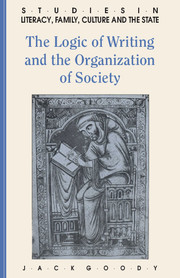4 - The letter of the law
Published online by Cambridge University Press: 05 June 2012
Summary
In this chapter I want to consider, as I have done with the other topics, how far the concept of law itself is influenced by the presence of writing, then to go on to discuss its relation to the logic (or rationality), the procedures, the institutions and the content of law. While there is much to say about the application of writing to the law in the Ancient Near East, not to speak of Greece and Rome, I want to draw my contrast largely between the recent situation in Africa on the one hand, and that in Europe, including England in the early Middle Ages, on the other, partly because this contrast has been in the minds of those authors like Bohannan, Epstein, Falters, Gluckman and others who have contributed so much to its analysis. Indeed it would be impossible to examine the situation without reference to European, and more specifically Anglo-American, legal systems.
The first problem, which is at once one of genesis and classification, was raised in a direct way by a writer on the legal system of Babylonia and Assyria. Of the earlier period, he asked, “the question remains, was it ‘right’ or ‘law’? Were there enactments by authority, making it clear what was right, and in some cases creating right, where there was none before? There was much to suggest the existence of enacted law, even of a code of laws” (Johns 1904: 39).
- Type
- Chapter
- Information
- The Logic of Writing and the Organization of Society , pp. 127 - 170Publisher: Cambridge University PressPrint publication year: 1986
- 3
- Cited by

